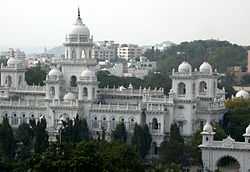Public Gardens, Hyderabad
Public Gardens also known as Bagh-e-Aam (Urdu: باغ عام) is a historic park located in the heart of the city of Hyderabad, India. It was built in 1846 by Osman Ali Khan, the VIIth Nizam of Hyderabad and is the oldest park in Hyderabad[1]
History
Public Gardens also known as Bagh-e-Aam or Bagham. In Urdu "Bagh" means Garden and Aam or Aam Jana means the public. Earlier during the Nizam regime, it was called as "Bagham". Later it called as Public Garden. Potti Sriramulu Telugu University, Well known open air theater "Lalitha Kala Toranam", "Jawahar Bal Bhavan", The Andhra Pradesh Legislative Assembly and Legislative council buildings are located here. Even today people use this as a recreation park. It is located at Nampally...
Attractions
A visit to the Andhra Pradesh State Archaeological Museum is a delight for art lovers. Located in the picturesque Public Gardens, the museum boasts of one of the richest repositories of antiques and art objects in the country. Built in 1920 by the Nizam VII, the museum building itself is a fine example of Indo-Saracenic architecture. The museum contains a Buddhist gallery, Brahmanical & Jain gallery, Bronze gallery, Arms & Armour gallery, Numismatics gallery, Ajanta gallery and more. Adjacent to the State Museum is the Contemporary Art Museum. Public Gardens: Hyderabad has several beautiful gardens, one of the most popular being the Public Gardens, which also encloses the State Legislature, State Archaeological Museum, Jubilee Hall, Jawahar Bal Bhavan and Telugu Lalita Kala Thoranam, an open-air theatre...
Landmarks
Public Gardens is home to some major landmarks in Hyderabad like the AP Legislative Assembly, Jubilee Hall, AP State Archaeology Museum, Indira Priyadarshini Auditorium, Asif Tennis Club, Potti Sriramulu Telugu University, Lalita Kala Thoranam, Jawahar Bal Bhavan, an old mosque are located inside this park.
References
- ↑ IFTHEKHAR, J S (17 June 2013). "Public Garden turns a real concrete jungle". The Hindu (Hyderabad).
- ↑ http://www.ourhyd.com
-

AP Legislative Assembly
